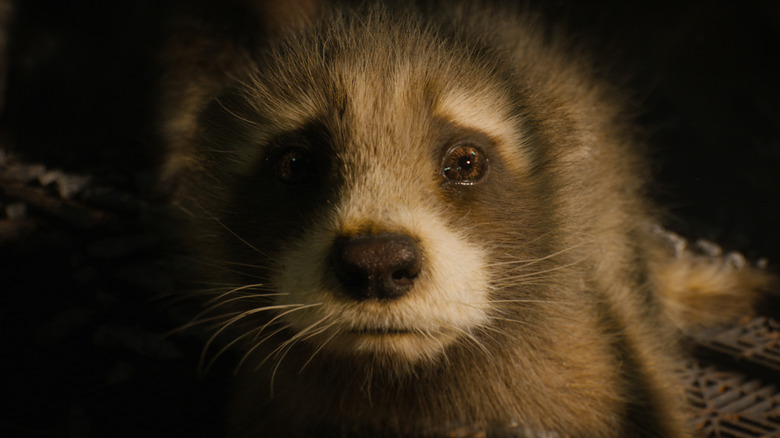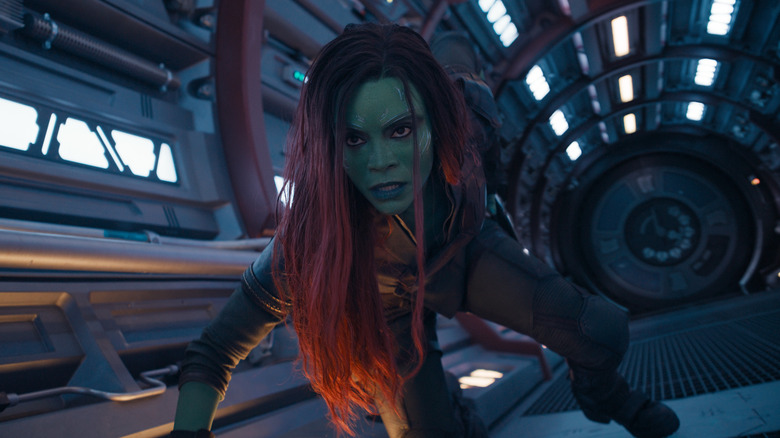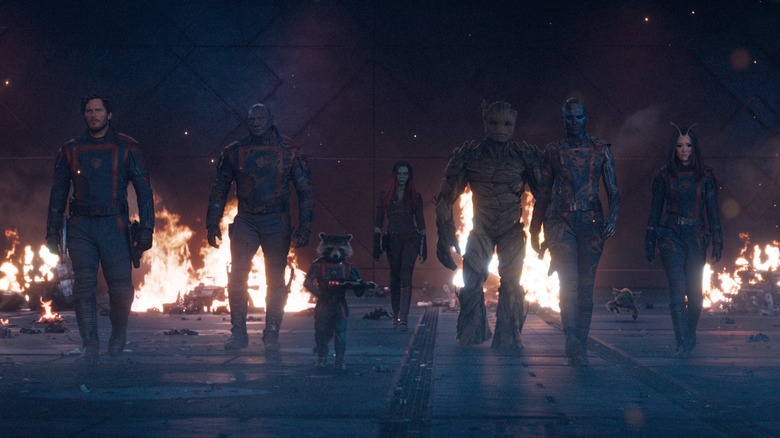Guardians Of The Galaxy Vol. 3's Animal Abuse Is Grim – But Necessary For The Story James Gunn Is Telling
This article contains spoilers for "Guardians of the Galaxy Vol. 3."
Looking back at the first two "Guardians of the Galaxy" films, what moments first come to your mind? They're probably something comedic and involve the fun use of a pop song, like Baby Groot dancing to The Jackson 5's "I Want You Back." These moments helped catapult this obscure Marvel team to the A-list, which once seemed impossible. However, these aren't the moments that pop into my head when I look back at the series.
The first image I see is the final shot of "Guardians of the Galaxy Vol. 2. As Cat Stevens' melancholic "Father and Son" plays, we see a close-up of Rocket Raccoon taking in the fireworks-filled Ravager funeral for Michael Rooker's Yondu, and tears start falling out of Rocket's eyes, a sight rarely seen. Not only does that moment act as the perfect capper to the film we've just seen — which I consider to be the best of the entire Marvel Cinematic Universe — it sets up that maybe it is finally time to peel back the layers of Rocket and find out what's going on inside of him.
This entire trilogy has been about processing trauma, usually caused by a father figure. Throughout the first two films, every character has the space to confront that trauma ... except Rocket, making him the angriest and most guarded of the group. Whatever made him get to that place has to both justify his level of anger and why we couldn't dive into it until their third movie together. "Guardians of the Galaxy Vol. 3" provides us those answers, and they are every bit as upsetting as you could imagine. For some, it's too much, but I think it has to be to feel that impact.
Animal experimentation should be horrific
We learn that Rocket was taken by the High Evolutionary (Chukwudi Iwuji) and experimented upon with genetic modifications to eventually create what the High Evolutionary believes to be the perfect society. Rocket isn't alone in this, as he also becomes friends with an otter, a walrus, and a rabbit, all of whom have been experimented upon in similar ways. We see limbs being replaced with metal parts, fur being shaved, skin tattooed, animals locked in cages, and a surprising amount of blood for a PG-13-rated film.
This is torture and abuse, all too familiar for us who live in a world where animal experimentation occurs daily. It's very difficult to watch, and I don't doubt there'll be moments that cause people to look away from the screen. If a film causes you to do that, some people see it as a failure, as the movie showing you something you shouldn't have to see. But turning your head away from the screen is exactly what you should be doing in that moment. That shows you have empathy, both for this character and for all the animals in the world forced to undergo this abuse.
James Gunn may make movies that have fun sequences in them, but the "Guardians of the Galaxy" movies (especially the latter two) wear their traumas on their sleeve. Grounding that trauma in a recognizable, deeply felt way transforms what could just be lightweight sci-fi comedies into emotionally sophisticated stories about characters, not caricatures. The movie taking us to the center of Rocket's pain makes us understand his anger and want him to find a way to reckon with it, eventually coming out on the other side as someone more at peace. You can't have that light without the dark.
Processing violence against animals vs. people
Part of what makes the Rocket backstory in "Guardians of the Galaxy Vol. 3" so upsetting is that it features violence against an animal, who have far less agency in the world than people. The day after I saw "Vol. 3," I went to go see Said Sadiq's feature debut "Joyland," and in the opening of that film, a character is forced by his father to slaughter a goat in the courtyard of their home. I was immediately brought back to "Guardians" and the pain I felt during those flashbacks. We see a helpless creature at the mercy of people who believe they can determine how these animals' lives will progress or end.
The discomfort and pain we feel for these animals is entirely justified, but I wish people afforded that same empathy to people, which I feel they don't — especially in cinema. The abuse suffered by Zoe Saldaña's Gamora and Karen Gillan's Nebula at the hands of Josh Brolin's Thanos is not all that dissimilar from what Rocket endured, but because violence against people is so commonplace in cinema, I don't think we fully grasp just how horrific what they went through. In "Avengers: Infinity War," Thanos tortures Nebula and straight-up murders Gamora, yet there is no conversation around that about whether they push things too far there.
All living things should be treated with the same respect and empathy, but cinema has done a great job of creating different tiers. The abuse or death of a person on screen should hold the same weight as a person, and I believe that James Gunn successfully breaks those tiers and understands that this trauma can bond together people of different species who all suffered similar things.
Climbing out of the darkness
Nearly every great story, particularly those that come out of Hollywood, involves someone overcoming the odds. A character goes through an incredible amount of adversity, and in the end, they are able to triumph. It is what we hope for in all of our own lives. We can process our past, our thoughts, our emotions, our fears, and our joys and come out on the other side with a better understanding of our families, friends, loved ones, and — most important — ourselves.
"Guardians of the Galaxy Vol. 3" gives us that story for Rocket Raccoon. This is a creature who, for two movies, has been emotionally closed off, angry, bitter, jealous, and territorial. Seeing how he became that pained is only part of the story, though. We also get to see him confront the forces that caused all of that pain, and crucially, he gets to make the choice about how it all resolves. The final act of "Guardians of the Galaxy Vol. 3" had me weeping behind my IMAX 3D glasses because Rocket finally got the opportunity to go face-to-face with his abuser, and the end result wasn't revenge, but justice. Not only does he put an end to the High Evolutionary's plan (which includes pointedly not killing him), but he also gets to save all of the other animals from going through what he did.
Like "Guardians of the Galaxy Vol. 2," this film also ends with a close-up of Rocket, but instead of silently weeping as he starts to open himself up to vulnerability, we see him joyfully, triumphantly dancing to Florence + the Machine's "Dog Days Are Over" with the biggest smile on his face. When I look back at this trilogy, that will now be the image that pops into my head.



